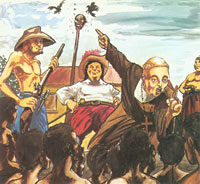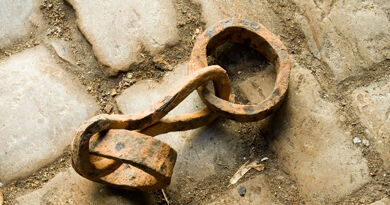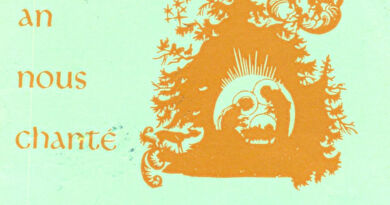The religious behavior of the first settlers
When the priests were lacking, the Commandant of the district temporarily filled the office of the parish priest: “He assembled his people, writes J.-B. Labat, the festivals and Sundays in the church, did some reading or exhortation, recited the prayers, warned of fasts and festivals; and, I believe, made fraternal corrections to those who departed from their duty ”.
When the priests were lacking, the Commandant of the district temporarily filled the office of the parish priest: “He assembled his people, writes J.-B. Labat, the same Father Labat was welcomed with open arms on his arrival in his parishes of Macouba, then François … For J. Rennard, the faith and zeal of the first inhabitants seems to be in no doubt “We like to make donations and gifts to the church, and sometimes valuable gifts: the monstrance of Marigot (Martinique) or the processional cross of the Vieux-Habitants (Guadeloupe) are testimonies”. There is no need to be surprised at this popular faith: in the 17th century, atheism is very rare, it is the privilege of a few great libertine lords, those whom their name shelters from prosecution. In addition, most of the settlers come from regions of France (Brittany, Normandy) where the Catholic influence is particularly strong. Add to this the difficulties of their business, the risks involved: they have seen many of their companions die, either on the boat that brought them to the islands, or on land, from any fever or as a result of a fight. Death is familiar to them and the need of the god, there more than elsewhere, is felt. Summers and Sundays in the church, did some reading or exhortation, recited the prayers, warned of fasts and festivals; and, I believe, made fraternal corrections to those who departed from their duty ”.
An unedifying life Christianization by force in the 17th and 18th century. Believers, the first settlers are. And yet, their behavior is not always of perfect holiness: fights, abuse of gambling, drinks, libertinism, give a hard time to the first religious, who keep asking the authorities for sanctions, sometimes very severe (language pierced with a hot iron, for example in blasphemy). It is that there is far from the faith in the practice of the biblical commandments in a universe where resourcefulness, law of the strongest, appetite for enjoyment remain the cardinal virtues of success, in a universe where the threat of death, the uncertainty of tomorrow will not only make you think of God, but also encourage you to make the most of the present moment. Far from quenching, this thirst for pleasure will find new impetus in the miraculous prosperity of the islands.
Superstitious beings There is more serious than this distortion between faith and morals. The Catholicism of the first settlers was marred by a whole series of beliefs and superstitions that we too often tend to forget. Black masses were common in the 17th century, wizards and witches were part of the landscape, we feared them, we spared them. Catholic traditions mingled in regions like Brittany, a marvelous Celtic, a whole pagan corpus that was not negligible. As a general rule, the era made a difficult distinction between witchcraft, magic and religion: as in the Middle Ages, Satan still fought there with God with all his presence, let’s say “physical”. Far from being (as it has become today for many theologians and Catholic faithful) only a symbol, the Prince of Darkness lived among the creatures of God, often possessed them, giving serious work to the exorcists . The priests themselves lived in the familiarity of the Devil, ready to guess him under the slightest petticoat, to pursue him with a poor hysteric, to challenge him with this permanent rival that was the sorcerer. This is how in 1657, Martinique was tortured with an alleged witch … And that a little later, Father Labat began to flush out the Negro sorcerers, some of whom paid with their lives for some prophecies of ‘all the more disturbing that they sometimes came true. Thus the Negro of M. Vanbel, burned alive at Saint-Thomas in 1701, whose deplorable destiny he tells us in his Voyages … Not only did we believe in God, but we believed in Satan, in his pomp, in his works , to his servants. And we believed, against certain evil magical practices, other beneficial practices just as magical as the first. Between using a doll to kill at a distance and pretending to hunt the Evil One by sprinkling holy water, there was hardly any difference …



